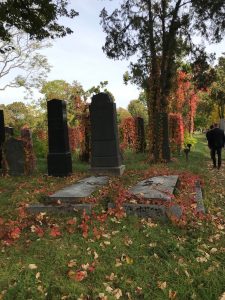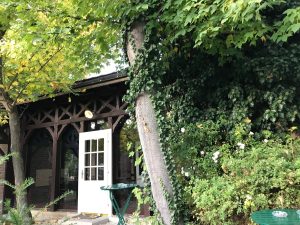As a lifelong coffee addict when I knew the EFC conference would be in Vienna I looked forward to sampling Viennese coffee, preferably in a suitably evocative setting, but I had not considered how the culture of the coffee house would become a metaphor for our discussion at our first in person gathering since Covid.
I learnt that the essence of Viennese coffee house culture is dialogue, it is a place where people from all walks of life can congregate and linger – with minimal financial outlay – and importantly it is a place where strangers can meet and connect. These spaces are not about laptops and Wi-Fi, and a true coffee house never has music, but they do have free newspapers, candles, and appropriately nonchalant staff.

Photo: Holly Donagh
I was lucky enough to go on a tour on the second day of our conference with a smaller group – we visited the main cemetery in Vienna where Beethoven and Wittgenstein are buried and we contemplated the nature of loneliness, the meaning of legacy and challenge of cultural coexistence. We went to a Jugendstil coffee House on the edge of the cemetery and split into pairs to practice the art of deep conversation through addressing a preprepared ‘question menu’. In this way we tested the notion that in conversation with a stranger you can have a more fulfilling and rich conversation than you might have with someone you know. Amongst other questions we asked each other ‘would you rather have more people at your wedding or your funeral?’ and ‘what did you rebel against as a child and what do you rebel against now?’. We got to know each other better.
In this small way we were practicing one of the big themes of the conference, that dialogue and connection are crucial to addressing the major challenges faced by the world. Crucially, this must be with those we disagree and with and those who are not currently around the table as well as with people we already know. There is no more time for talking to ourselves and reinforcing our own sense of the dominant world view, we must seek out people we might disagree with and /or people we don’t understand. As Kumi Naidoo from Africans Rising, one of our keynote speakers said ’we have to love those who voted for Trump’.
This theme was repeated in the session on ‘foresight’ and building a new approach to thinking about the future asking the question ‘whose imagination are we currently living in?’. The point being that if ideas lead to plans and plans lead to change, whose ideas are never given real airtime or a chance to be enacted?
As Laskshmi Sundaram from Open Democracy said this is not about inviting new faces into our debate but going out and finding new tables that we can ask to be part-of, having new conversations with people who already have solutions and then asking, ‘how can we be useful to you?’
Mathieu Lefevre from More in Common talked about a third of the population in the countries they have recently researched fitting-in to the category of the ‘invisibles’. This group is fundamentally alienated and disengaged from public and political life and are highly distrustful of the media and institutions etc. It is a group that has grown during the Pandemic and linked to increased loneliness and retreat. Matt asked how much we as foundations know about these people (who will be crucial to the direction of the post covid recovery and the battle against climate change) and who are calling for opportunities to have more agency in their lives.

Concordia Schlössl Wien. Photo: Holly Donagh
As a hopeful answer Antoine Burret offered the example of the Third Places movement. These are places (actual physical buildings) where people congregate regardless of class, political affiliation, demography etc that have some infrastructure to help people develop their ideas or generate new projects. They might start as a studio for making or fabrication but what they become is a space of encounter where different kinds of people would get to know each other better. A modern-day coffee house perhaps.
In an era when our high streets have been fundamentally reshaped – first by homogenisation and chain stores and now by the move to online shopping – there might be something to look for in finding new spaces of encounter where we can all learn to know each other better.
Holly Donagh is Director, Strategic Learning, Insight and Influence at Paul Hamlyn Foundation



Comments (0)